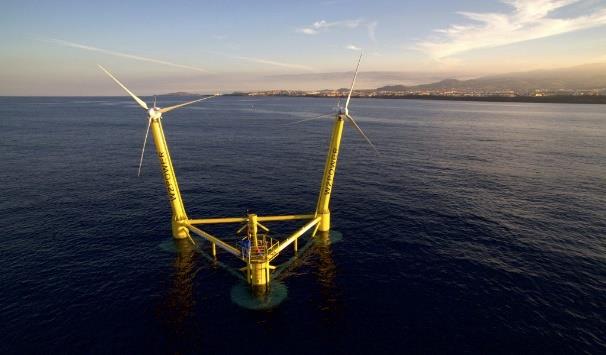
Offshore renewable energy and aquaculture are two rapidly growing industries that share a common resource: the ocean. Bringing together these two industries has the potential to generate economic, environmental and social benefits, while addressing multiple challenges – from food scarcity to climate change.
The AquaWind project is developing a prototype, which aims to create an innovative offshore platform to produce electricity and food, and mitigate climate change impacts in the Atlantic Sea Basin. This innovative technology consists of a floating platform that supports a wind turbine (the W2Power prototype) while also containing facilities for aquaculture. These include tanks for fish farming and equipment for monitoring and controlling water quality and fish health. The aquaculture component of the prototype can be used for different types of fish, as well as for other marine organisms, such as seaweed and shellfish.
AquaWind is led by the Government of the Canary Islands in Spain (GOBCAN) with partners from academia, industry, and fisheries associations. Co-funded by the European Maritime, Fisheries and Aquaculture Fund (EMFAF) to support the Atlantic Maritime Strategy, AquaWind is expected to contribute to the sustainable expansion of the Blue Economy in the Atlantic Sea Basin.
As stated by project coordinator GOBCAN, AquaWind “is the only European initiative that combines the production of renewable energy on the high seas and fish farming in the first floating wind platform in Spain, capable of jointly producing wind energy and high-quality fish".
The AquaWind project aims to demonstrate the technical feasibility, economic viability and environmental sustainability of the multi-use platform. The focus is on the testing of the offshore wind energy generation prototype together with aquaculture to determine the opportunities for scaling up this technology.
AquaWind is an exciting example of how innovative thinking and collaboration can lead to sustainable solutions for complex problems. This innovative solution has the potential to address multiple societal challenges, such as energy security, food security, and climate change adaptation, by providing clean energy and healthy food while preserving marine ecosystems. Finally, the project can generate economic opportunities for coastal communities, through the creation of jobs in local value chains.
- Project duration
- 1 Sep 2022 - 31 Aug 2025
- Project locations
- FranceSpainPortugal
- Overall budget
- €1 333 148
- EU contribution
- €1 066 51880% of the overall budget
- Project website
- https://aquawind.eu/project/
Stakeholders
Coordinators
Gobierno De Canarias (GOBCAN) (Spain)
Participants
Consulta Europa Projects and Innovation Sl (CE) (Spain)
- Website
- https://consulta-europa.com/
Universidad De Las Palmas De Gran Canaria (ULPGC) (Spain)
- Website
- https://www.ulpgc.es/
Consorcio Para El Diseño, Construcción, Equipamiento Y Explotación De La Plataforma Oceánica De Canarias (PLOCAN), (Spain)
- Website
- https://plocan.eu/
Asociación Cluster Marítimo De Canarias (CMC) (Spain)
- Website
- https://www.clustermc.es/
EnerOcean S.L. (EnerOcean) (Spain)
- Website
- https://enerocean.com/
INNOSEA (INNOSEA) (France)
- Website
- https://innosea.fr/
Wavec/Offshore Renewables - Centro De Energia Offshore Associacao (WAVEC) (Portugal)
- Website
- https://www.wavec.org/
